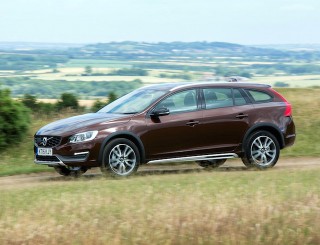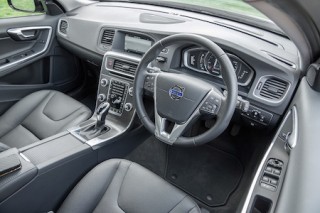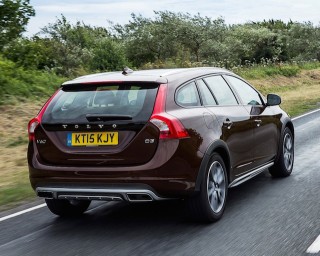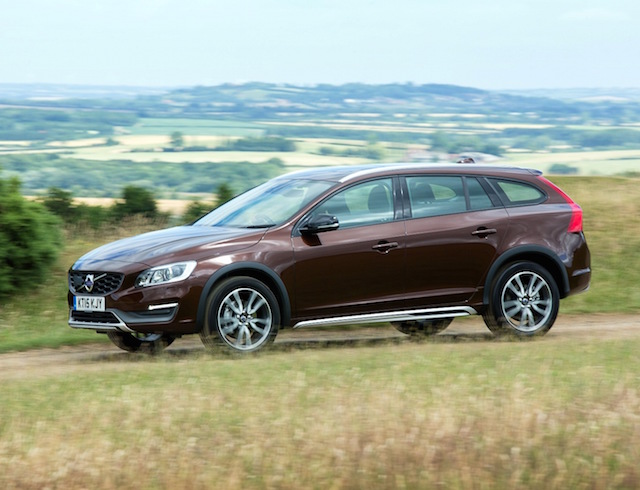 As model types converge with manufacturers eager for new car sales exploiting every gap in the market so we get more – ‘Crossovers’ mostly with elevated ground clearance.
As model types converge with manufacturers eager for new car sales exploiting every gap in the market so we get more – ‘Crossovers’ mostly with elevated ground clearance.
Volvo, the Swedish premium brand owned by the Chinese Geely Automotive group, is not new to such models.
They introduced their V70 Cross Country, a crossover between an estate and an SUV in 1997.
Two years ago Volvo went back to the Cross Country theme by introducing higher ground clearance two and four wheel drive versions of their V40 C-segment hatchback range.
Now it is the turn of the S60 four door saloon and V60 five door estate, both classed as C-D segment, or upper medium sized models, to receive the Cross Country two or four wheel drive treatment.
Volvo of course is not unique in offering ‘jacked-up’ versions of estates with and without 4WD. The S60 Cross Country that is thought to be the world’s first crossover saloon.
Other competitor estates to the V60 Cross Country with higher ground clearance include the Audi A4 Allroad, Skoda Octavia Scout and Subaru Outback and of course many more manufacturers now offer 4×4 traction for conventional saloons and estates.
The conventional lower ride height S60/V60 models with petrol, diesel and hybrid power units are Volvo’s third best selling ranges behind the V40 hatchback with 18,000 annual UK sales and the XC60 midsized SUV with 9,000 UK sales. The S60 saloon will achieve around 2,000 sales this year and the V60 estate around 4,000.
When it comes to the new additions the S60 Cross Country saloon is only expected to attract 100 UK sales in a full year and the V60 Cross Country estate around 850 sales.
Nikki Rooke, head of Volvo Car UK Public Affairs said at the media launch that 80% of customers are expected to choose a 2WD version, 70% will be business user-choosers and fleet customers and there will be a 50/50% sales split between manual and automatic transmission options.
All models are available only with diesel engines and prices range for the smaller number of versions in the S60 Cross Country saloon line-up between £33,695 and £36,725. For the V60 Cross Country estate prices range from £30,195 to £38,025. The most popular version in the S60/V60 Cross Country line-up is likely to be V60 Cross Country estate, 2WD, D4 manual SE Nav priced at £32,245. The S60 Cross Country saloon is available with only with Lux Nav specification but with two D4 engine choices.
One engine is their new powertrain family Drive-E, EU6 compliant 2.0-litre, four-cylinder turbo-diesel with 190hp and 400Nm of torque with manual transmission and front wheel drive, with CO2 emissions of 111g/km and Benefit-in-Kind company car tax is 20%. The other unit is their older D4 2.4-litre, five-cylinder 190hp, 420Nm turbodiesel unit with their Geartronic automatic gearbox and AWD traction with CO2 emissions of 149g/km and BIK tax is 27%.
The V69 Cross Country estate line-up is more comprehensive reflecting the higher level of expected sales. There are SE, SE Nav, Lux and Lux Nav spec levels depending on the engine chosen.
The engine line-up is D3, a Drive-E, 2.0-litre, four cylinder turbodiesel with 150hp, 350Nm of torque, with manual transmission and front wheel drive, CO2 of 113g/km and BIK tax at 20%. The engine line-up then follows the S60 Cross Country saloon with the Drive-E, D4 190hp unit and 2WD and the D4, 2.4-litre 190hp engine with Geartronic auto and AWD.
 The S60/V60 range competes against the Audi A4, BMW 3-Series and Mercedes-Benz C-Class being similar in size to the BMW but less than the new A4 and C-Class.
The S60/V60 range competes against the Audi A4, BMW 3-Series and Mercedes-Benz C-Class being similar in size to the BMW but less than the new A4 and C-Class.
Interior space, particularly in the rear and the load area of the estate are not its best attributes but the quality and design of the interior is certainly premium class.
The S60/V60 Cross Country has steeply raked front and rear screens, a rising waistline and relatively small side windows. The V60 estate takes the Cross Country higher ground clearance design more easily than the S60 saloon.
Both are high quality products and in true Volvo style they are filled with safety equipment both for passengers, driving aids, pedestrian protection and alerts for other traffic.
The crux of the Cross Country versions is the ground clearance raised by 65mm with underbody skid plates front and rear, side sill scuff plates with bumper extenders portraying a muscular image and a capable nature and twin integrated exhaust tailpipes reflect a sportier image than the standard models on which they are based. The added cost of a Cross Country variant over a conventional version is around £1,200.
Who will be the customers? Basically they fall into two categories; those that like the off-road styling and those that need the extra ground clearance for work such as vets, surveyors, architects and farming or country folk.
 My first UK test drive was in the likely best selling version, the V60 Cross Country estate with the Drive-E, D4, 2.0-litre 190hp four cylinder diesel engine with SE Nav spec and carrying a price-tag of £32,245.
My first UK test drive was in the likely best selling version, the V60 Cross Country estate with the Drive-E, D4, 2.0-litre 190hp four cylinder diesel engine with SE Nav spec and carrying a price-tag of £32,245.
In addition to that price there are numerous extra cost option and packs including a £1,900 Driver Support Pack which includes lots of safety systems which being a Volvo I would have expected to be standard equipment.
There was also a Winter Illumination pack which in addition to upgrade lights also included heated front seats, and heated windscreen which added yet another £1,375 to the price.
Core to this model is the Drive-E D4 190hp turbodiesel engine with its six-speed manual gearbox and front wheel drive which I have driven before in other V60 versions. This is a really strong unit and very responsive with 400Nm of torque delivered from 1,750rpm. Even though the gearing is tall for optimum fuel economy and low CO2 emissions, the acceleration was brisk and the all important mid range response was ‘gutsy’.
You can even feel ‘torque-steer’ in third gear during acceleration. In town the engine is flexible and at cruising speeds it was relaxed and best of all it was relatively quiet at all speeds.
If a vehicle looks like a 4WD model, my personal view is that it should have 4WD traction so I also tried the V60 Cross Country D4 2.4-litre, five-cylinder turbo-diesel unit which also produces 190hp but with slightly more torque at 420Nm but delivered at a lower 1,500rpm with drive as standard through Volvo’s smooth Geartronic auto gearbox and of course supplying traction on demand to all four wheels.
Top speed is slightly slower at 127mph as is acceleration at 8.9-seconds for the zero to 62mph dash. The Combined Cycle fuel economy figure is much lower at 49.6mpg and my test drive over the same route returned 39.4mpg.
With CO2 emissions of 149g/km, VED road tax is £149 every year and company car tax goes up to a high 27% but insurance is only one group more at 29. Again this unit felt strong and refined but didn’t really give any better performance than the newer Drive-E 2.0-litre 190hp unit, its only advantage is that it comes as a package with 4WD.
 In the handling and ride comfort departments the V60 Cross Country models have a firm but not uncomfortable ride.
In the handling and ride comfort departments the V60 Cross Country models have a firm but not uncomfortable ride.
The effects of the increased ride-height is mostly felt during cornering where when the vehicle with its raised centre of gravity felt less sure-footed in both 2WD and 4WD forms.
During higher cornering speeds the Cross Country estate was less well planted and it tended to wash wide on the exit out of bends. The steering gave little in the way of feedback as well and road noise intrusion also seemed to have increased over conventional V60 models.
If 4WD in a medium sized estate is really a necessity then the Volvo V60 Cross Country should be considered. But buying it just because of its higher ground clearance and muscular styling doesn’t really add up and Volvo’s limited numbers UK sales predictions probably reflect that.
MILESTONES:
Volvo V60 Cross Country 2WD five-door estate, D4 Manual SE Nav £32,245.
Engine/transmission: Drive-E, 2.0-litre, 4-cylinder, turbodiesel 190hp, 400Nm of torque from 1,750rpm, 6-speed manual, 2WD.
Performance: 130mph, 0-62mph7.8-seconds, 67.3mpg Combined Cycle (46.9mpg in test) CO2 113g/km, VED road tax £0/30, BIK company car tax 20%.
Insurance group: 28 Warranty: 3-years/60,000-miles. Dimensions/capacities: L 4,635, H 1,545mm, W 1,899mm, boot/load space430 to 1,241-litres, braked towing weight 1,800kg.
For: SUV crossover styling, increased ground clearance gives some off-tarmac capability, Drive-E strong and responsive engine performance, low running costs and taxes, premium quality.
Against: Drive-E 2.0-litre engine not available with 4WD, higher suspension makes handling performance less controlled, road noise intrusion, not hat roomy as an estate, becomes very expensive when some safety options are added.

